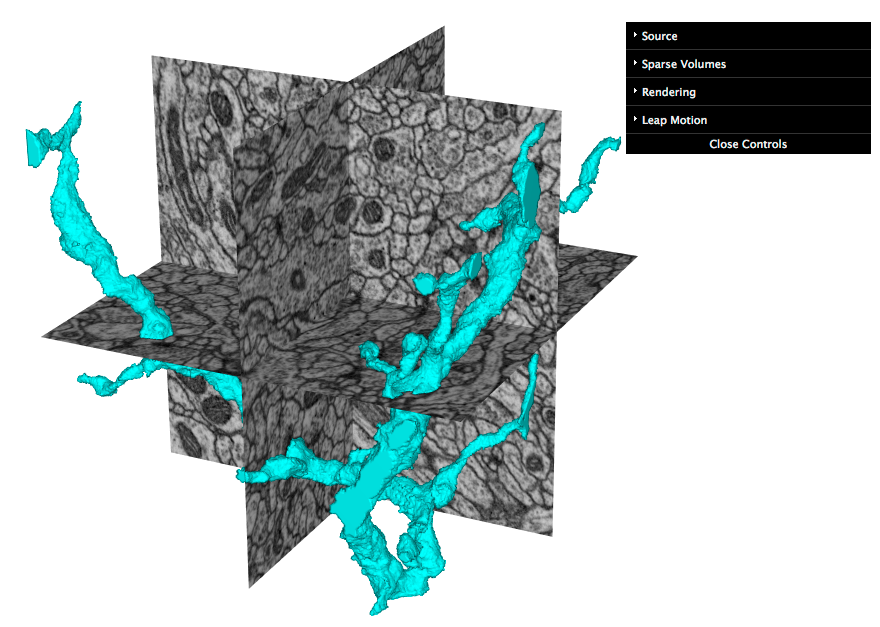 Documentation
¶
Documentation
¶
Overview ¶
DVID is a *distributed, versioned, image-oriented datastore* written in Go that supports different storage backends, a Level 2 REST HTTP API, command-line access, and a FUSE frontend to at least one of its data types. It has been tested on both MacOS X and Linux (Fedora 16, CentOS 6) but not on Windows.
The starting point for DVID documentation is the README.md file in the DVID repo: https://github.com/janelia-flyem/dvid#dvid-
 Directories
¶
Directories
¶
| Path | Synopsis |
|---|---|
|
cmd
|
|
|
Package datastore provides versioning and persisting supported data types using one of the supported storage engines.
|
Package datastore provides versioning and persisting supported data types using one of the supported storage engines. |
|
Package datatype provides interfaces for arbitrary datatypes supported in DVID.
|
Package datatype provides interfaces for arbitrary datatypes supported in DVID. |
|
annotation
Package annotation supports point annotation management and queries.
|
Package annotation supports point annotation management and queries. |
|
common/downres
Package downres provides a system for computing multi-scale 3d arrays given mutations.
|
Package downres provides a system for computing multi-scale 3d arrays given mutations. |
|
common/labels
Package labels supports label-based data types like labelblk, labelvol, labelsurf, labelsz, etc.
|
Package labels supports label-based data types like labelblk, labelvol, labelsurf, labelsz, etc. |
|
common/proto
Package proto is a generated protocol buffer package.
|
Package proto is a generated protocol buffer package. |
|
googlevoxels
Package googlevoxels implements DVID support for multi-scale tiles and volumes in XY, XZ, and YZ orientation using the Google BrainMaps API.
|
Package googlevoxels implements DVID support for multi-scale tiles and volumes in XY, XZ, and YZ orientation using the Google BrainMaps API. |
|
imageblk
Package imageblk implements DVID support for image blocks of various formats (uint8, uint16, rgba8).
|
Package imageblk implements DVID support for image blocks of various formats (uint8, uint16, rgba8). |
|
imagetile
Package imagetile implements DVID support for imagetiles in XY, XZ, and YZ orientation.
|
Package imagetile implements DVID support for imagetiles in XY, XZ, and YZ orientation. |
|
keyvalue
Package keyvalue is a generated protocol buffer package.
|
Package keyvalue is a generated protocol buffer package. |
|
labelarray
Package labelarray handles both volumes of label data as well as indexing to quickly find and generate sparse volumes of any particular label.
|
Package labelarray handles both volumes of label data as well as indexing to quickly find and generate sparse volumes of any particular label. |
|
labelblk
Package labelblk supports only label volumes.
|
Package labelblk supports only label volumes. |
|
labelgraph
Package labelgraph implements DVID support for data using the underlying graph storage engine.
|
Package labelgraph implements DVID support for data using the underlying graph storage engine. |
|
labelmap
Package labelmap handles both volumes of label data as well as indexing to quickly find and generate sparse volumes of any particular label.
|
Package labelmap handles both volumes of label data as well as indexing to quickly find and generate sparse volumes of any particular label. |
|
labelsz
Package labelsz supports ranking labels by # annotations of each type.
|
Package labelsz supports ranking labels by # annotations of each type. |
|
labelvol
Package labelvol supports label-specific sparse volumes.
|
Package labelvol supports label-specific sparse volumes. |
|
multichan16
Package multichan16 tailors the voxels data type for 16-bit fluorescent images with multiple channels that can be read from V3D Raw format.
|
Package multichan16 tailors the voxels data type for 16-bit fluorescent images with multiple channels that can be read from V3D Raw format. |
|
roi
Package roi implements DVID support for Region-Of-Interest operations.
|
Package roi implements DVID support for Region-Of-Interest operations. |
|
tarsupervoxels
Package tarsupervoxels implements DVID support for data blobs associated with supervoxels.
|
Package tarsupervoxels implements DVID support for data blobs associated with supervoxels. |
|
Package dvid provides types, constants, and functions that have no other dependencies and can be used by all packages within DVID.
|
Package dvid provides types, constants, and functions that have no other dependencies and can be used by all packages within DVID. |
|
Package server configures and launches http/rpc server and storage engines specific to the type of DVID platform: local (e.g., running on MacBook Pro), clustered, or using cloud-based services like Google Cloud.
|
Package server configures and launches http/rpc server and storage engines specific to the type of DVID platform: local (e.g., running on MacBook Pro), clustered, or using cloud-based services like Google Cloud. |
|
Package storage provides a unified interface to a number of storage engines.
|
Package storage provides a unified interface to a number of storage engines. |
|
swift
Package swift adds Openstack Swift support to DVID.
|
Package swift adds Openstack Swift support to DVID. |
Click to show internal directories.
Click to hide internal directories.



